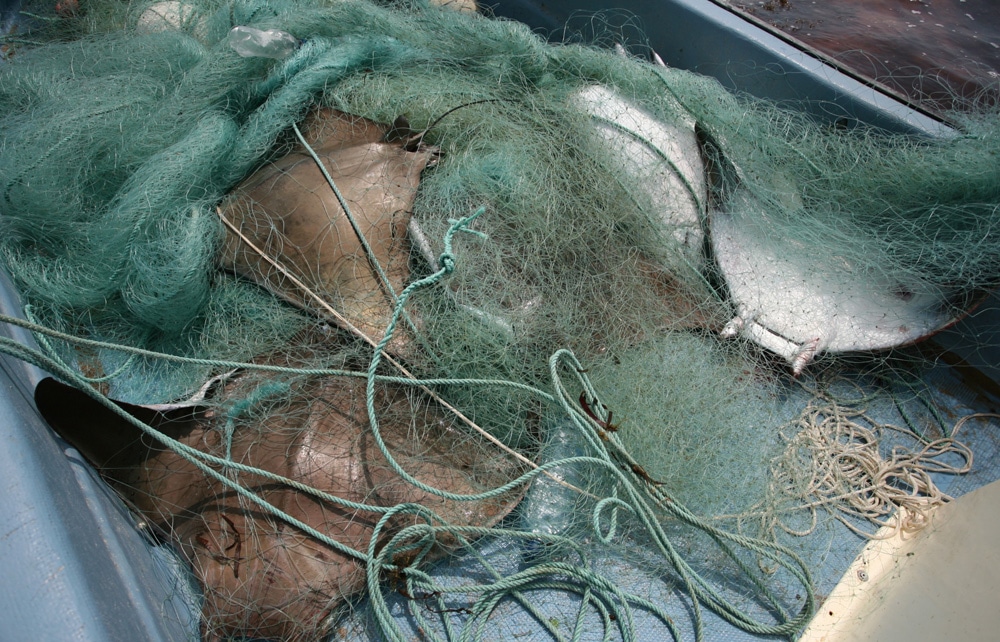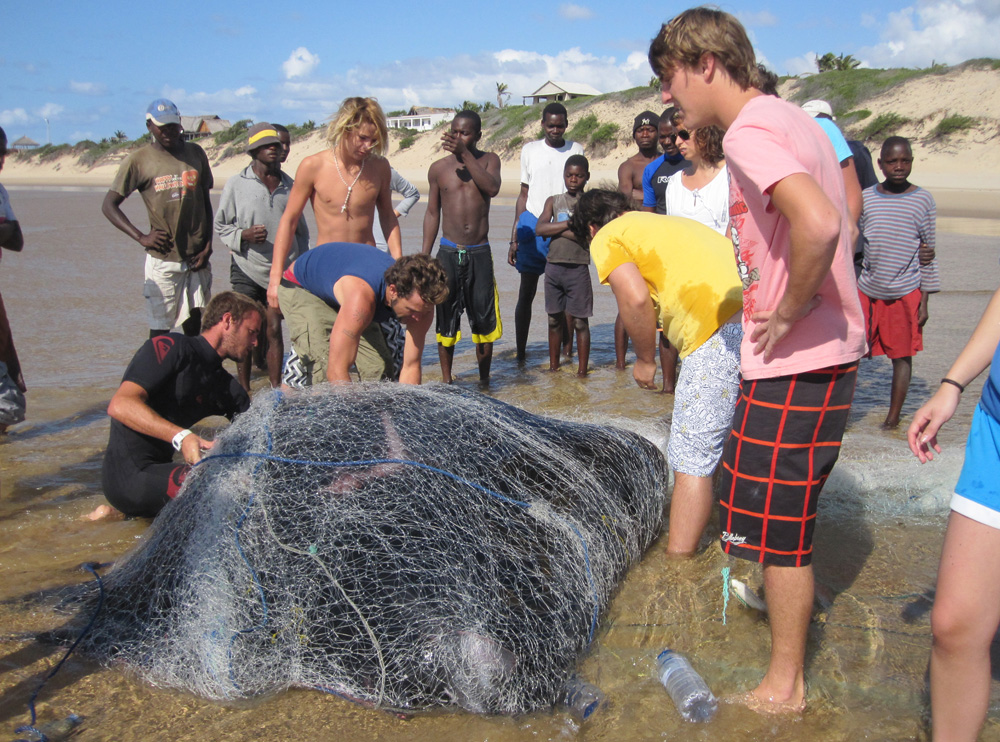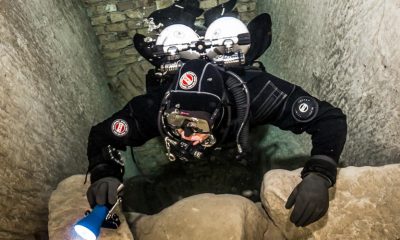Marine Life & Conservation
Mantas and Whale Sharks gain protection under new law in Mozambique
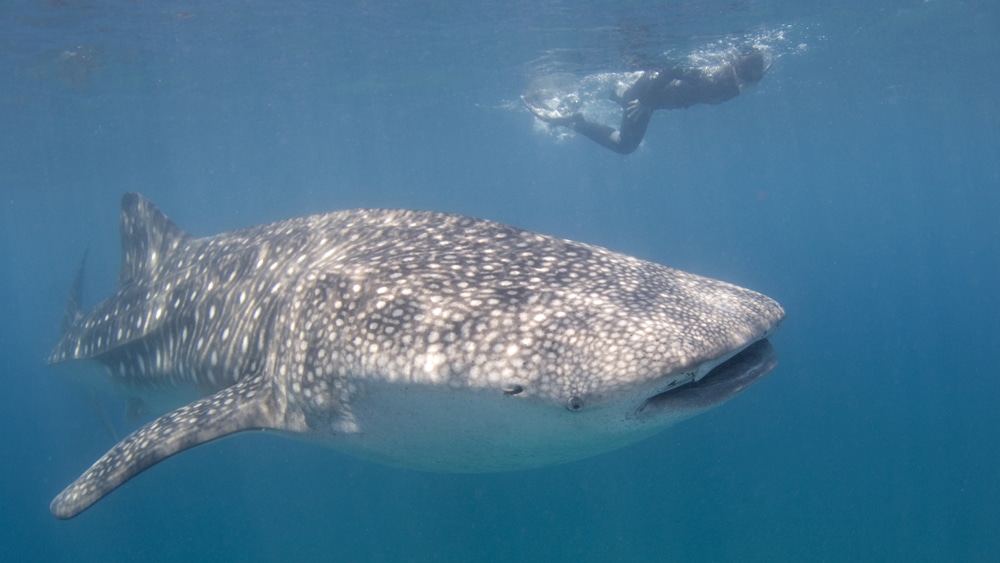
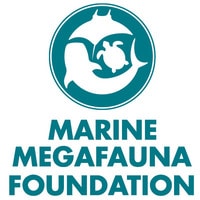 After 20 years of research and lobbying efforts, the Marine Megafauna Foundation (MMF) is thrilled to announce a major legislative victory for ocean life in Mozambique. A new commercial fishing law enacts sweeping protections for several threatened species, including whale sharks, manta rays, and all mobula species.
After 20 years of research and lobbying efforts, the Marine Megafauna Foundation (MMF) is thrilled to announce a major legislative victory for ocean life in Mozambique. A new commercial fishing law enacts sweeping protections for several threatened species, including whale sharks, manta rays, and all mobula species.
This new legislation is a huge step in the right direction for the protection of threatened marine species in Mozambique. MMF commend the Mozambican government for taking these bold steps to protect the region’s breathtaking sea life, while still supporting the local fishing culture and economy.
“This law will make it far easier for our fishing communities to manage their impact by empowering them to create no-take zones and enforce rules limiting the use of gear that is destructive to important coral reef and mangrove habitats,” says MMF Conservation Project Manager Emerson Neves. “This will help us achieve our goal of sustainable fishing for generations to come, so we can both conserve our incredible fish life and allow people to have a stable livelihood and food source.”
The passing of this law is no small feat and has taken years of scientific research and lobbying by NGOs and institutions, including MMF, to highlight the importance of establishing protections for the threatened marine species in the region. MMF are grateful that the government has responded to the data and recommendations of scientists which has led to the formation of these new regulations.
MMF has been researching whale sharks and mobula rays in Mozambique for almost two decades. Their achievements have included the discovery that manta rays are two separate species and the first formal studies of these species in Africa. “The largest identified populations of both reef and giant manta rays in Africa have been identified off the southern Mozambican coastline, making it a critical region for their conservation in the Western Indian Ocean,” explains MMF Co-founder and Principal Scientist, Dr. Andrea Marshall.
MMF has also led groundbreaking research on whale sharks in the region. Their research into the importance of the whale shark habitat in the area and increasing human pressures, such as accidental catch in gill nets, which has halved their global population since the 1980s, helped to justify their inclusion in this new law.
“The Mozambican coast is an internationally important habitat for whale sharks, the world’s largest fish,” elaborates Dr. Simon Pierce, MMF Co-founder and Principal Scientist. “Protection in Mozambican waters provides a safeguard for the species locally, where whale sharks are the basis for sustainable marine ecotourism, but will also help these gentle giants to recover in the broader Indian Ocean. The Mozambique government has taken a commendable step for the worldwide conservation of this endangered species.”
Some of the most crucial and troubling data captured by MMF shows dramatic declines in observational sightings of marine megafauna like manta, mobula rays, and whale sharks. In 2013 they reported a 79% decline in whale shark sightings and an 88% decline in reef manta sightings, and sadly these trends continue. Their data now show declines of over 90% for giant mantas, reef mantas, and shortfin devil rays in the south of the country.
“Evidence of these stark declines, which have been attributed in large part to localized fishing pressure, are a testament to the urgency of these protections which go into effect today,” states Dr. Marshall.
MMF researchers have estimated the economic importance of manta rays and other megafauna to the Mozambican tourism industry, highlighting the economic incentive for their protection. The study, lead-authored by Dr. Stephanie Venables a senior scientist at MMF, illustrated the economic impact of manta ray tourism in the Inhambane province, including $34 million USD per year of direct economic impact of manta ray tourism, and a projected yearly loss of $16-$25 million USD if Mozambique were to lose manta rays.
Healthy populations of megafauna are crucial for maintaining healthy oceans. Manta rays and whale sharks are listed as vulnerable or endangered on the IUCN Red List with declining populations worldwide. Local conservation measures, like this law, are vital for the overall persistence of these species. Every organism plays an important role in an ecosystem, but ocean giants often play vital roles in maintaining balance and regulating resources in their environments. This in turn, naturally keeps fish populations healthy and improves the viability of fishing industries into the future.
In addition to the protection granted to mantas, mobulas, and whale sharks, the law also includes the following new regulations:
- Fishers must land the full body of any sharks caught with fins attached
- New clearer regulations for CCPs (community fishing councils)
- A ban on destructive fishing practices on coral, seagrass, or mangroves
- A ban on the harvesting of live coral
- Bycatch must be thrown back unless you have prior written permission to use it for research
- Turtle excluder devices are mandated on industrial and semi-industrial nets
While this law is a significant breakthrough, a number of other important species were not given protection. “This new protection is a huge step in the right direction and we’re thrilled that Mozambique is recognizing the importance of some of the species we study, but there are other rare and endangered species in Mozambique that still lack protection,” explains MMF Manta Research Manager, Anna Flam.
“We’re hoping to use the positive momentum from this new law, combined with our research, to lobby Mozambique to add protection for hammerhead sharks, smalleye stingrays, leopard sharks, and wedgefish, among other vulnerable species.”
MMF is currently working with other NGOs to submit a list of species that we believe must be added as an amendment to the new law.
For more information about the work of MMF visit their website by clicking here.
Images: Dr. Andrea Marshall
Marine Life & Conservation
Double Bubble for Basking Sharks

 The Shark Trust is excited to announce that, for two more days only, all donations, large or small, will be doubled in the Big Give Green Match Fund!
The Shark Trust is excited to announce that, for two more days only, all donations, large or small, will be doubled in the Big Give Green Match Fund!
Donate to Basking in Nature: Sighting Giants
The Shark Trust is hoping to raise £10k which will be doubled to £20k. This will go towards Basking in Nature: Sighting Giants. And they need YOUR help to reach they’re goal.
The Shark Trust’s citizen science project is to monitor and assess basking sharks through sightings; encouraging data collection, community engagement, and promoting nature accessibility. This initiative aims to enhance health and wellbeing by fostering a deeper connection with British Sharks.
Campaign Aims
- Increase citizen science reporting of Basking Sharks and other shark sightings to help inform shark and ray conservation.
- Provide educational talks about the diverse range of sharks and rays in British waters and accessible identification guides!
- Create engaging and fun information panels on how to ID the amazing sharks and rays we have on our doorstep! These can be used on coastal paths around the Southwest. With activities and information on how you can make a difference for sharks and rays!
- Promote mental wellbeing through increasing time in nature and discovering the wonders beneath the waves!
Donate, and double your impact. Click Here
Marine Life & Conservation
Leading UK-based shark conservation charity, the Shark Trust, is delighted to announce tour operator Diverse Travel as a Corporate Patron

 Corporate Patrons provide a valuable boost to the work of The Shark Trust. The Trust team works globally to safeguard the future of sharks, and their close cousins, the skates and rays, engaging with a global network of scientists, policymakers, conservation professionals, businesses and supporters to further shark conservation.
Corporate Patrons provide a valuable boost to the work of The Shark Trust. The Trust team works globally to safeguard the future of sharks, and their close cousins, the skates and rays, engaging with a global network of scientists, policymakers, conservation professionals, businesses and supporters to further shark conservation.
Specialist tour operator Diverse Travel has operated since 2014 and is committed to offering its guests high quality, sustainable scuba diving holidays worldwide. Working together with the Shark Trust will enable both organisations to widen engagement and encourage divers and snorkellers to actively get involved in shark conservation.
“Sharks are truly at the heart of every diver and at Diverse Travel, we absolutely share that passion. There is nothing like seeing a shark in the wild – it’s a moment that stays with you forever!” says Holly Bredin, Sales & Marketing Manager, Diverse Travel.
“We’re delighted to celebrate our 10th year of business by becoming a Corporate Patron of the Shark Trust. This is an exciting partnership for Diverse and our guests. We will be donating on behalf of every person who books a holiday with us to contribute towards their vital shark conservation initiatives around the world. We will also be working together with the Trust to inspire divers, snorkellers and other travellers to take an active role – at home and abroad – in citizen science projects and other activities.”
Paul Cox, CEO of The Shark Trust, said:
“It’s an exciting partnership and we’re thrilled to be working with Diverse Travel to enable more divers and travellers to get involved with sharks and shark conservation. Sharks face considerable conservation challenges but, through collaboration and collective action, we can secure a brighter future for sharks and their ocean home. This new partnership takes us one more valuable step towards that goal.”
For more information about the Shark Trust visit their website here.
For more about Diverse Travel click here.
-

 News3 months ago
News3 months agoHone your underwater photography skills with Alphamarine Photography at Red Sea Diving Safari in March
-

 News3 months ago
News3 months agoCapturing Critters in Lembeh Underwater Photography Workshop 2024: Event Roundup
-

 Marine Life & Conservation Blogs2 months ago
Marine Life & Conservation Blogs2 months agoCreature Feature: Swell Sharks
-

 Blogs2 months ago
Blogs2 months agoMurex Resorts: Passport to Paradise!
-

 Blogs2 months ago
Blogs2 months agoDiver Discovering Whale Skeletons Beneath Ice Judged World’s Best Underwater Photograph
-

 Gear Reviews2 months ago
Gear Reviews2 months agoGear Review: Oceanic+ Dive Housing for iPhone
-

 Marine Life & Conservation2 months ago
Marine Life & Conservation2 months agoSave the Manatee Club launches brand new webcams at Silver Springs State Park, Florida
-

 News3 months ago
News3 months agoWorld’s Best Underwater Photographers Unveil Breathtaking Images at World Shootout 2023


